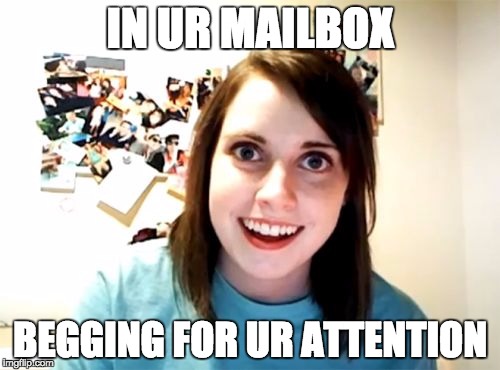Dear [Firstname] at [Company],
Today, you sent me a message that pushed me over the edge after a blogging hiatus that has been far longer than I like to think about.
Subject line: “Was it something we did?”
Body: I have no idea, do you honestly think I opened that? The message was clearly based on some pre-configured logic catching users who signed up for your service eons ago, then stopped using it. I’ve tested a lot of services for work in the past year, most of which I’ve left behind. It was less something you did and more something we didn’t.
But why oh why would you think it’s appropriate, funny, cute, or *shudder* engaging to sound like a needy ex-partner?
AWKWARD!
Today’s overly attached subject line was not an isolated incident, of course. Just a handful of fairly recent examples from my inbox:
- A subject line welcoming me to the [service] family, message starting with “Hey, you’re awesome!!”
- A “thank you for upgrading to a pro account” message signed “Your friends at [company]”
- A service sign-up response with the subject line “Friend, welcome to [service]”
All sent, of course, by [Firstname] at [Company] — a trick so ubiquitous it no longer stands out in the least in the increasingly crowded Promos section of my Google Inbox.
Most of my personal and even work messages now go through chat, but everyone and their grandmother’s company is bombarding me with email as a lead or customer — “drip campaigns”, auto-responders and quasi-personal messages intended to steer me along the journey to conversion from lead to customer, and from customer to evangelist.
But I must admit, [Firstname] at [Company], it’s increasingly rare that I even open your messages. And you just seem to get chummier and chummier.
I expect your company does a lot of A/B testing, so please do tell me: Does the bromance lingo actually work on a majority of your targets? Because to me, really, very little could be more alienating.
It may have to do with regional culture, it may have to do with being too old to be part of the main target group for Every Marketing Campaign on Earth — millennials — but honestly, even a few millennials have mortgages and PTA duties and the odd gray hair and cellulite at this point, are you really sure they don’t prefer being talked to like grownups?
And for those who would be on board with the “you’re awesome double exclamation mark” thing amongst actual friends, are you sure they don’t see you as something of a wannabe, or like the awkward parent who picked up a little bit of slang 10 years ago and still thinks it’s the bomb?
Why Can’t We Be Friends?
One of the reasons I’m ranting about this is that since going from tech writer at a massive corporation to information architect at a small company where everyone wears a rich selection of hats, technical marketing for the business-to-business market is a form of communication I’ve suddenly had to care about. I’ve been reading up. And I’ve despaired, discovering that “landing pages” does not actually describe pages for visitors to land on, but pages for businesses to land people’s email addresses.
After reading a few more marketing blog posts than was clearly good for me, a bit too much of it started to make sense. Then, thankfully, I was lucky enough to spend most of last week at the Information Architecture Summit, an amazing conference about IA and user experience, whose theme this year was inclusion and “a broader panorama”. What happens when we put people at the center, when we design inclusive experiences, when we genuinely care about the humanity of every user, visitor, customer? And I came back reassured that what doesn’t happen is shiny happy auto-responders holding hands. (I learned a bunch of other stuff, too. There will be more blogging.)
So no, it’s not that I don’t think that businesses can have interesting information to share with (potential) customers by automated email, or that customers and vendors cannot have a friendly tone when they know each other — on the contrary. But here’s the thing, [Firstname] at [Company], the two are entirely separate things. And because you are not a person, but a set of merging and mailing rules, that is something you will never understand.
And that is why we can’t be friends. So can you please drop the act?
Not exactly yours,
Jorunn

![[Firstname] at [Company], are you sure you're not sounding a little like Vanilla Ice: Oh, I'm just coolin?](https://andedam.org/wordpress/wp-content/uploads/2016/05/vanilla-ice.gif)